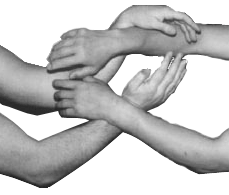For this reason, Chi Sau practice is practically impossible to quantify as the permutations of posture, strategy of teacher, fight experience and physiology of teacher and student, bear down heavily on output before we even begin to bring a ‘state of mind’ into the equation.
If we draw into consideration the
personal experience of individuals, there are a variety of circumstances that
would begin to dictate how functional Chi Sau practice might be in the development of
skill for use whilst fighting.
We could ask ourselves,
- Do I possess prior experience of fight behaviour and contact?
- Can I recognise body mechanics and a relationship to gravity?
- Was I engaging, and discussing with senior grades and teachers with a fighting background?
- Have I experienced other exponent’s hands and methods outside of one school or lineage?
- Was there transmission of experience and dedicated passing of plays to address change?
- Do I comprehend when I am struck, and the availability to strike safely from a variety of positions?
- Am I humble? Am I patient? Have I donated sufficient time with superiors to the practice of Chi Sau?
There is so much to consider, so many variables, so many good and bad circumstances and predicaments, it is not surprising that so many approaches co-exist.
But a couple of things remain
constant.
The above list dictates to some
degree, skill, perspective, experience and honesty.
For successful transfer to fighting, the above list is not optional. For practical transfer from teacher to student, a list like this should operate as a prerequisite for improving fight competency from one generation to the next.
If, as a tick list you are incapable of ‘ticking’ the boxes above, there is a blind spot in perspective, a blind spot that you might
wish to address, and a blind spot that might leave martial artists and potential students with an opinion that Chi Sau
is non functional in the development of fighting. More importantly it could
leave you with your teeth in your hand.
For successful transfer to fighting, the above list is not optional. For practical transfer from teacher to student, a list like this should operate as a prerequisite for improving fight competency from one generation to the next.
Wing Chun development needs to be checked against real time eventualities on a contextual basis. If you do not posses a battle checked model for Chi Sau, teaching and training is dangerous. If your understanding and experience cannot adequately pull apart an exchange within striking distance to encompass attack methods familiar and unfamiliar to Wing Chun combat form, then necessarily it is time that you speak with a teacher, or examine other types of fighting in preparedness to meet that and cope accordingly.
My Wing Chun Website
My Wing Chun Youtube Channel
My Wing Chun Facebook
My Wing Chun Twitter




No comments:
Post a Comment